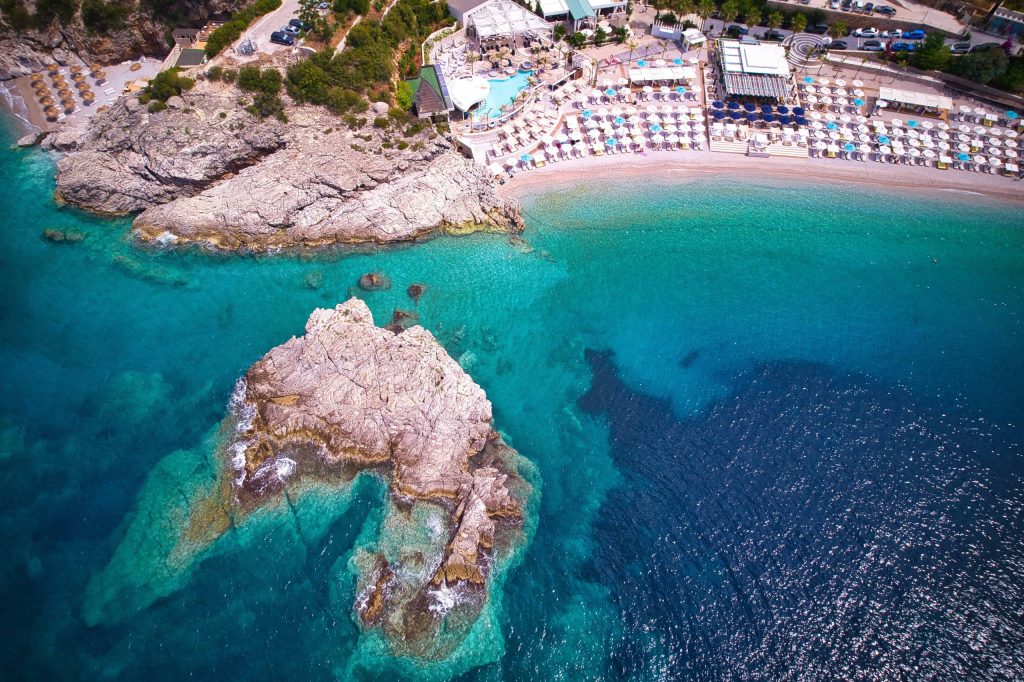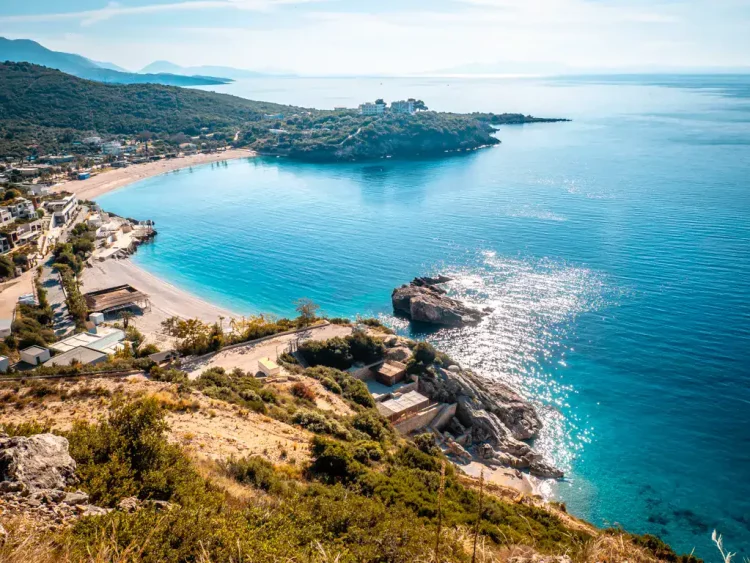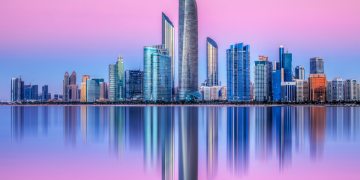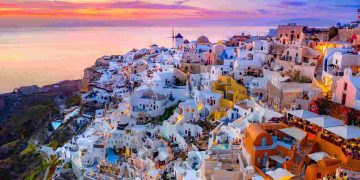The Balkan Surprise Everyone’s Talking About
In the summer of 2024, something unusual happened on TikTok travel feeds. Instead of influencers crowding Dubrovnik’s iconic medieval walls or sipping Aperol spritz in Split, a new wave of posts showed hidden beaches, turquoise coves, and charming stone villages in a country that many still couldn’t place on the map—Albania. The hashtags #Ksamil, #Himarë, and #AlbanianRiviera exploded with millions of views, and suddenly Albania, long overshadowed by its Balkan neighbors, was being hailed as “the new Croatia.” For many, this wasn’t just a new destination—it was a revelation.
The surge wasn’t purely digital hype. From May to September 2024, Google Trends recorded a 270% increase in global search interest for “Albanian beaches,” while tourism platforms reported that summer bookings in towns like Dhërmi, Ksamil, and Vlorë surpassed even pandemic-era Croatian growth rates. Travelers, particularly younger and budget-conscious ones, were looking for something different. Albania, with its crystalline Ionian coastline, low prices, and relative obscurity, checked every box.
Why Albania Is Captivating a New Generation of Travelers
For Gen Z and millennial travelers, value and authenticity often matter as much as aesthetics—and Albania delivers both. While Croatia has become a victim of its own success, with rising prices and cruise-ship congestion, Albania offers a quieter, less commercialized version of the Adriatic dream. Coastal villages like Himarë still have pebble-strewn beaches with only modest beachfront hotels. Beach bars serve local raki instead of ten-euro cocktails, and most seafood dinners cost less than a single appetizer in Split.
Ksamil, in particular, has become the face of this new Albanian allure. Located just south of Sarandë and close to the Greek island of Corfu, it boasts white-sand beaches and shallow, turquoise bays that resemble the Maldives more than the Balkans. What’s more, this town went from under-the-radar to viral thanks to a single TikTok clip showing an aerial shot of beach umbrellas and paddle boats on glowing water. Within weeks, tourism operators in Ksamil were scrambling to keep up with the sudden demand.
Albania’s appeal also stems from its rawness. There are no mega-resorts, few global hotel chains, and limited infrastructure in some places. But this is exactly what many travelers now seek—a destination where they can explore, not consume. Driving along the winding coastal SH8 highway feels like discovering Greece before it was fully mapped. There are ancient hilltop castles, Ottoman bridges, and trails that lead to coves so remote they don’t appear on Google Maps.
The Budget Advantage: Why Albania Wins on Price
Croatia may still reign in luxury travel, but Albania dominates when it comes to affordability. In 2024, the average daily cost for a tourist in Albania was less than half that of Croatia. Boutique hotels in Himarë and Ksamil offer rooms for $50–70 a night in high season. Meals at beachside tavernas rarely exceed $15 per person, including fresh-caught seafood, Albanian wine, and homemade desserts. Transportation—by car rental or minibus—is inexpensive and often scenic.
This cost edge has made Albania particularly popular with digital nomads, backpackers, and solo travelers. Many European Gen Zers now see Albania as the entry point to the Balkans, bypassing Croatia entirely. With visa-free access for most countries and fast-expanding tourist infrastructure, it’s easy to spend weeks here without breaking the bank.
But Albania isn’t just cheap—it’s good. The quality of food, especially along the coast, rivals that of better-known Mediterranean countries. From stuffed mussels in Vlorë to lamb slow-roasted with herbs in Gjirokastër, Albanian cuisine is rustic, regional, and deeply tied to tradition. Markets burst with seasonal produce and homemade olive oil, and village families still bake bread in outdoor clay ovens.

Beyond the Coast: Castles, Mountains, and Ancient Ruins
While TikTok made the beaches famous, Albania’s inland regions are quickly earning their own acclaim. Travelers who venture beyond the Riviera are discovering a landscape of wild mountains, UNESCO-listed towns, and historical depth.
Gjirokastër, a stone-built hillside city known as the “City of a Thousand Steps,” offers cobblestone alleys, Ottoman-era mansions, and panoramic fortress views. UNESCO also protects Berat, a city of stacked white houses and ancient churches that earned it the nickname “City of Windows.” These towns are emerging as cultural complements to the coastal boom.
Then there’s the Albanian Alps—also known as the Accursed Mountains—a remote, glacier-carved wilderness in the north that rivals the best alpine hikes in Europe. In 2024, guided trekking routes between Theth and Valbona saw a 60% increase in foreign bookings, especially among European eco-travelers seeking solitude and sustainability. Budget hikers camp under the stars or stay in family-run guesthouses for less than $25 a night, often with home-cooked meals included.
And let’s not forget Butrint, one of the most significant archaeological sites in the Balkans. Overlooking a lagoon near Ksamil, its Roman amphitheaters, Byzantine basilicas, and Venetian fortifications paint a rich picture of Albania’s layered past—another reminder that this country is more than just pretty beaches.
Cultural Warmth and Authentic Encounters
One of the most cited reasons travelers fall in love with Albania isn’t the scenery—it’s the people. Hospitality is a core value here. From shopkeepers who insist you try their olives to hosts who invite you in for rakia and slow-cooked goat stew, Albania retains an intimacy that’s rare in overtouristed Europe.
In interviews with backpackers and travel vloggers, many describe how they arrived expecting a beautiful coastline and left moved by the cultural connection. TikTok may have sparked curiosity, but it’s the human experience that’s cementing Albania’s status as a must-visit country. Albanians are proud of their history, generous with their time, and curious about the world beyond—a sentiment that tourists feel, even in the most remote corners.
This warmth is reinforced by a tourism industry still built on family businesses. Many lodges, restaurants, and tour services are run by local families eager to share their home region, not just sell it. That sense of ownership gives Albania’s tourism a soul that travelers increasingly crave.
Will Albania Sustain Its Tourism Boom?
There’s no question that 2024 was a breakout year for Albanian tourism—but what comes next? Can the country handle rising visitor numbers without losing its charm? That’s the question now facing government officials, sustainability experts, and community leaders.
Some signs are encouraging. The Albanian government has taken steps to regulate coastal development, protect natural reserves, and upgrade roads and utilities in popular destinations. Several NGOs are working with locals to promote responsible tourism and support traditional crafts. In Himarë and Ksamil, new accommodations are favoring low-impact, boutique-style hotels over mega complexes.
Still, the challenges are real. Infrastructure remains thin in some areas, especially during peak summer months. Trash management and water conservation will become urgent as more visitors arrive. And there is always the risk of overtourism repeating the mistakes seen in parts of Croatia and Greece.
What will define Albania’s future as a destination is how well it balances visibility with authenticity. If it stays rooted in its culture and natural beauty—while thoughtfully adapting to global interest—it could set the new standard for sustainable tourism in Southern Europe.
Conclusion: A New Chapter for Undiscovered Europe
In 2024, Albania went viral—and for once, it wasn’t just hype. With a mix of untouched beaches, mountain adventure, cultural richness, and real affordability, the country has emerged as a magnetic alternative to the tourist-worn trails of Croatia. But Albania isn’t simply “the new Croatia.” It’s something different: less polished, more personal, and deeply moving in its unspoiled essence.
For budget explorers, slow travelers, and curious adventurers, Albania offers a rare opportunity to experience Europe at its most honest and beautiful. The TikToks may have introduced it to the world, but what will keep people coming back is what the camera can’t fully capture: hospitality, history, and the feeling that you’ve stumbled onto a secret worth savoring.





















